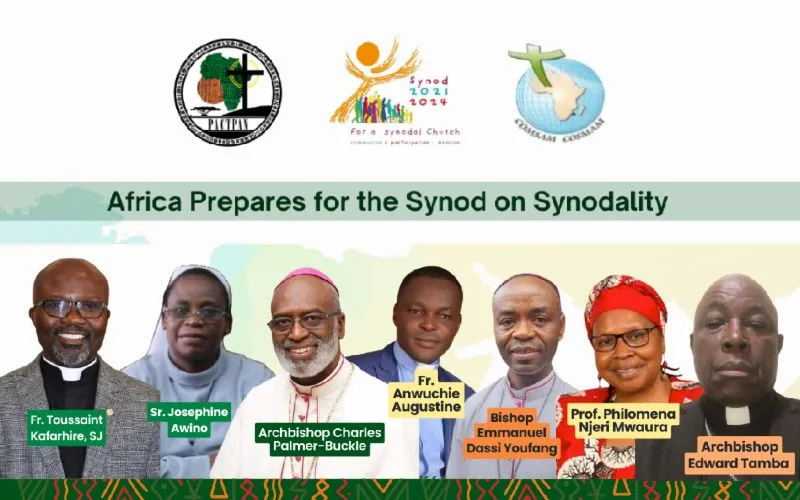“Many people believe that a Bishop is supposed to be an all-round person who is able to perform all the functions one can imagine as a leader of a local Church. But local Churches differ based on their different situations,” the Ghanaian Bishop said.
“People say that a Bishop should be a social advocate, and do everything else. But I want to believe that when a leader of a particular local Church is being sought, the situation of that local Church is first of all studied before they start looking for the candidates to take up its leadership,” he said, adding in selecting a Local Ordinary among the names presented, it is the candidate that responds more adequately to what that local Church is in need of that becomes Bishop.
This, Bishop Fianu said, does not mean that the one selected can do everything that pertains the leadership of that Diocese.
“The most important thing then is for us to rely on the human resource that is available to us as local ordinaries,” he said, and added, “That human resource may be from the Priest, the Consecrated men and women, and even the lay people.”
“The Bishop may not be very good in advocacy but if there is someone good in advocacy in that particular Diocese, the Bishop may use them to do advocacy. If he isn’t a good administrator himself but finds somebody that is good in administration, then he will be able to carry out his task fully,” he explained.
(Story continues below)
According to the Local Ordinary of Ho, “a Bishop cannot do everything, but must rely on others.”
“As Bishops, we must be ready to collaborate with the expertise that we have so that the local Church can thrive,” he said, and added, “We all need to work together so that the Bishop as the leader shows us direction of where we are going after listening to the faithful.”
The PACTPAN palaver further explored the importance of seeking God's will in choosing Bishops.
A concept note that PACTPAN and COMSAM shared with ACI Africa ahead of the event read, “How can the criteria for the appointment of Bishops in Africa be improved to address some persistent challenges and crisis of episcopal succession in some African dioceses?”
The theologians made reference to several account where appointed Bishops had been rejected by those they had been appointed to shepherd in African Dioceses, adding that in some instances, the Bishops had been “attacked in mysterious circumstances.”
“This synodal moment offers the opportunity for Africans to look at what can be changed or improved to make episcopal nomination reflective of God’s will for the good of the Church and the salvation of God’s people on one hand, while reducing those unethical practices that promote sycophancy, and corruption and lack of transparency in the process,” the theologians said in their concept note.
In his presentation at the palaver, John Cardinal Onaiyekan observed that the discussions on the criteria of selection of a Bishop “require a lot of courage”.
He said he had joined the palaver eager to see if the discussion would delve into how Bishops are chosen. “That would require a lot of courage,” he said, and added, “It would also require that we know how Bishops are chosen right now, and what rules and protocols are used for us to suggest where to improve.”
“We need to ask ourselves whether what is happening now is not enough, and if so, what needs to be improved,” the Nigerian Cardinal said.
Sharing about his appointment to serve as Bishop, the Cardinal who started his Episcopal Ministry in January 1983 as Auxiliary Bishop of Nigeria’s Ilorin Diocese said, “I don’t know how I was made Bishop. I don’t know who did what and who said what.”
“All I know is that I was one day called to the Nunciature and told the Pope had decided to make me a Bishop. I accepted it knowing that the appointment was coming from the successor of St. Peter guided by the Holy Spirit,” he said.
The Archbishop emeritus of Nigeria’s Catholic Archdiocese of Abuja reiterated the sentiments of other participants at the palaver who maintained that Bishops in Africa have a unique experience owing to the realities of the continent.
“Being a Bishop in Africa is not the same thing as being a Bishop in a place such as Washington. Yet God always has a hand in every appointment,” he said.
According to the 80-year-old Nigerian Cardinal who retired as Archbishop of Nigeria’s Abuja Archdiocese in November 2019, there is no uniform way of how Bishops are supposed to conduct themselves.
“I never knew of a situation where Bishops gathered for any kind of training or seminar to teach one what to do as Bishop. All of us who are already in it try our individual best depending of the circumstances and challenges we are facing,” he said.
“Let’s not think that every Bishop has to behave in one particular way or the other,” Cardinal Onaiyekan said and explained, “There are general concepts of humility, service and concern for the people. Beyond that, I think we should always rely on God and the Lord Jesus who is always choosing his apostles.”
Agnes Aineah is a Kenyan journalist with a background in digital and newspaper reporting. She holds a Master of Arts in Digital Journalism from the Aga Khan University, Graduate School of Media and Communications and a Bachelor's Degree in Linguistics, Media and Communications from Kenya's Moi University. Agnes currently serves as a journalist for ACI Africa.








